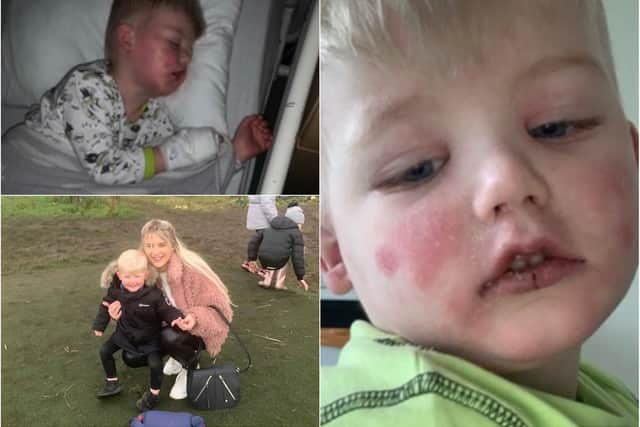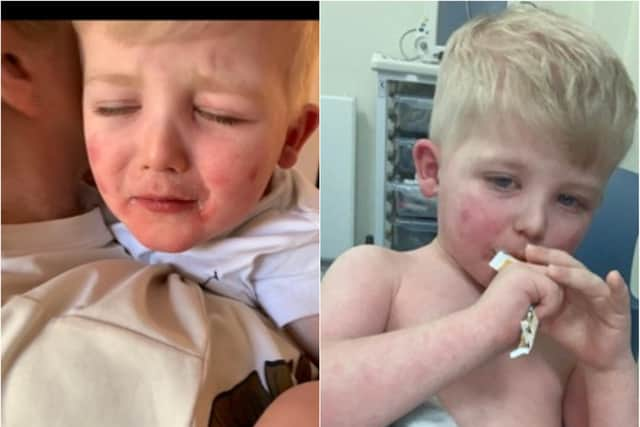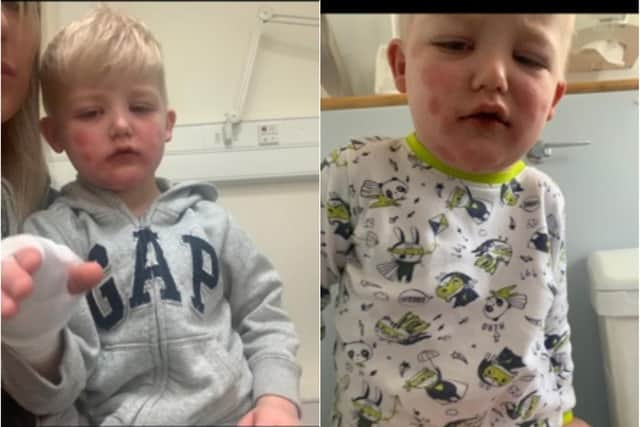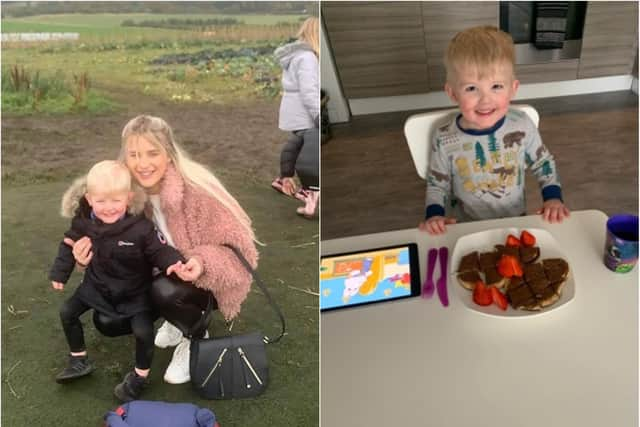'He was lifeless, like a zombie' - Edinburgh mum issues warning after son, 3, hospitalised with coronavirus-linked Kawasaki disease
and live on Freeview channel 276
Chloe Knight said her son, Freddie Merrylees, was taken to the Edinburgh Sick Kids Hospital three times before doctors were satisfied his symptoms were consistent with the disease, an inflammatory condition that attacks blood vessels and the heart, after initially suspecting it to be Scarlet fever.
The 22-year-old mum of two said her boy developed symptoms including a rash on his body, high fever, red eyes and a cracked mouth and became drowsy and struggled to eat or drink before he was hospitalised on March 16th.
Advertisement
Hide AdAdvertisement
Hide AdScans done by doctors in the hospital also revealed the valves leading to Freddie's heart had swollen up.


According to the NHS these are typical symptoms of Kawasaki disease, which only affects about eight in 100,000 children in the UK each year who are mainly aged under five.
The details come after it emerged today that British and Italian health experts are investigating a possible link between coronavirus and symptoms of Kawasaki Disease in children.
Speaking to the Edinburgh Evening News on Tuesday, Miss Knight says she wants to warn other parents about the dangers.


Advertisement
Hide AdAdvertisement
Hide AdMiss Knight, who lives near Fort Kinnaird, said: “It was definitely the worst week of my life.
“It’s heartbreaking when you know something is wrong with your child, you just feel helpless and you would much rather have it yourself. Being a mother, if you think you see something wrong with your child, keep pushing until you get the assurances.”
‘He was lifeless, like a zombie’
Miss Knight said Freddie left hospital after five days and that she developed a cough, high temperature and a loss of taste and smell, symptoms consistent with those of Covid-19 – but neither she or her son were tested for it at the time.


Little Freddie was first taken to the doctor on Thursday, March 12th after developing a rash and was given penicillin for suspected Scarlet fever – a contagious infection which mainly affects children – but he struggled to take the medication.
Advertisement
Hide AdAdvertisement
Hide AdHis symptoms worsened and he was taken to the hospital but was told by a doctor he would be on the mend in just a few days.
By the Sunday, Freddie was sleep deprived and the corners of his mouth were cracked and puss was appearing and the whites of his eyes had turned red.
Miss Knight said his nose started to bleed that afternoon and he was taken to hospital again, but the nurse felt he was responding well and put it down to Scarlet fever which would soon disappear.


Miss Knight continued: “I started crying because I felt like it was something a lot more. He was just lifeless, like a zombie, there was nothing there. Anyone who knows Freddie would know he’s the most hyper little boy – something was wrong.”
Advertisement
Hide AdAdvertisement
Hide AdBy Monday, his whole face was covered in blotches and he kept complaining about pain in his mouth and that he couldn’t swallow.
Freddie was then admitted to the Sick Kids Hospital and put on a drip, and the next day a doctor identified a heart murmur which led to scans revealing swollen valves leading to his heart.
Since being released from hospital, Freddie has been taking aspirin in combination with another medication as part of his treatment.
Children tend to make a full recovery within six to eight weeks but complications can develop if it’s not treated promptly.
Advertisement
Hide AdAdvertisement
Hide AdMiss Knight added: “I can’t praise the doctors and nurses at the Sick Kids Hospital enough, they were brilliant with Freddie and made his experience there that much better.”
Possible links to Covid-19
Freddie’s story comes after it emerged on Monday that an urgent alert was issued to doctors in London about a rise in children being admitted to intensive care due to a ‘coronavirus-related condition.’
The alert said there is a “growing concern” that a Covid-19 related inflammatory syndrome is emerging in children in the UK, or that there may be another, as yet unidentified, infectious pathogen associated with these cases.
It is understood some of the children with Kawasaki disease have tested positive for Covid-19, with some appearing to have had the virus in the past, but some haven’t had it at all. The fact that many fewer children than adults have had serious illness with the coronavirus or died remains the case.
Advertisement
Hide AdAdvertisement
Hide AdItalian and British medical experts are investigating a possible link between the coronavirus pandemic and clusters of severe inflammatory disease among infants who are arriving in hospital with high fevers and swollen arteries.
Doctors in northern Italy, one of the world’s hardest-hit areas during the pandemic, reported extraordinarily large numbers of children under the age of nine with severe cases of what appears to be Kawasaki disease, which is more common in parts of Asia.
Both Kawasaki-related diseases and covid-related complications in children are very rare, and as yet this is no confirmed link between the two.
The alert is a standard way of making sure clinicians are made aware of any potential emerging links so that they are able to give children and young people the right investigations and care fast.
Advertisement
Hide AdAdvertisement
Hide AdDr Tracey Gillies, medical director of NHS Lothian, said: “Due to patient confidentiality we cannot comment on individual cases without patient consent.
“It is extremely important that families continue to follow advice by the Royal College of Paediatrics which urges parents or carers to contact their GP practice or call 111 if their child is unwell.
“If the situation is urgent, they should attend their relevant emergency department where social distancing measures and other preventative measures are in place to minimise risk of infection.”
NHS Lothian has not seen any increase in children with Kawasaki disease but their medical teams remain vigilant.
Advertisement
Hide AdAdvertisement
Hide AdProfessor Simon Kenny, NHS national clinical director for children and young people, said on Monday: “Thankfully Kawasaki-like diseases are very rare, as currently are serious complications in children related to Covid-19, but it is important that clinicians are made aware of any potential emerging links so that they are able to give children and young people the right care fast.
“The advice to parents remains the same: if you are worried about your child for whatever reason, contact NHS 111 or your family doctor for urgent advice, or 999 in an emergency, and if a professional tells you to go to hospital, please go to hospital.”
A Scottish Government spokesperson said: “We are aware of a very small number of cases in England, involving children, who have become seriously unwell with Covid-19 like symptoms that some clinicians in England have been alerted to.
“While serious complications in children related to Covid-19 are very rare, it is important that clinicians are made aware of any potential emerging links so they are able to give children and young people the right care as fast as possible. We are working closely with Public Health England to ensure the right information is shared consistently across the UK.”